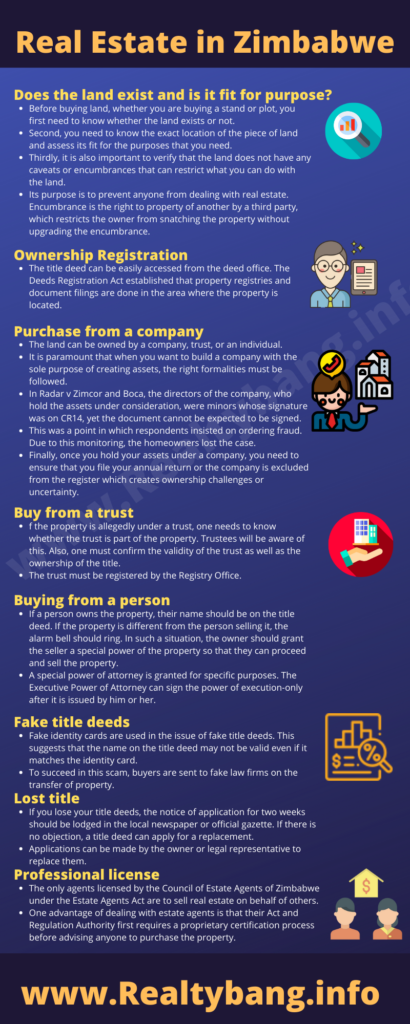Buying Real Estate in Zimbabwe: As citizens of Zimbabwe, we all know someone who has been the victim of some kind of scam related to real estate property. It may be a person who is a seller of land or who does not own or has not been sold.
It is a reasonable reason for us to be a buyer before purchasing a property and to adequately protect them for purchase.
In this article, we will focus on the measures you can take to protect yourself from falling prey, those who sell their property to those who do not belong to them, and how you acquire real estate after acquiring them. We do. What can be done? Here are some aspects to consider:
Does the land exist and is it fit for purpose?
Before buying land, whether you are buying a stand or plot, you first need to know whether the land exists or not. This seems obvious, but some people are in a hurry to pay for the land they have not seen. If you are naive then some people are ready to cheat you.
Second, you need to know the exact location of the piece of land and assess its fit for the purposes that you need. Given an option, you will not want to buy land in the marshy area or specify open land to build a house.
If you are not sure of the permission to use the land, you can check with the local authority whether it is permissible in some areas.
Thirdly, it is also important to verify that the land does not have any caveats or encumbrances that can restrict what you can do with the land. A warning is supported for formal property notices and title deeds recorded on real estate.
Its purpose is to prevent anyone from dealing with real estate. Encumbrance is the right to the property of another by a third party, which restricts the owner from snatching the property without upgrading the encumbrance.
Ownership Registration
The title deed can be easily accessed from the deed office. The Deeds Registration Act established that property registries and document filings are done in the area where the property is located.

Registration for property in Gweru, Gowanda, Tshlotsho, Binga, Kwekwe, Lupane, or Victoria Falls will apply to the registry of land in Bulawayo, while land in Chipping, Kariba, Uzibaa-Maramba-Pfungwe, Masvingo, Harare, or Guruve. Registration for the Karma Registry in Harma will be affected.
Buying Real Estate in Zimbabwe
Purchase from a company
The land can be owned by a company, trust, or an individual. To see this, it is important to know about different categories. If it is a company, it has to look at CR14 and CR2 to find out the names of directors and shareholders, respectively.
It is paramount that when you want to build a company with the sole purpose of creating assets, the right formalities must be followed.
In Radar v Zimcor and Boca, the directors of the company, who hold the assets under consideration, were minors whose signature was on CR14, yet the document cannot be expected to be signed.
This was a point in which respondents insisted on ordering fraud. Due to this monitoring, the homeowners lost the case. Finally, once you hold your assets under a company, you need to ensure that you file your annual return or the company is excluded from the register which creates ownership challenges or uncertainty.
Buy from a trust
If the property is allegedly under a trust, one needs to know whether the trust is part of the property. Trustees will be aware of this. Also, one must confirm the validity of the trust as well as the ownership of the title.
The trust must be registered by the Registry Office. If anyone has any doubt, it is he and whoever wants to seek the guidance of a lawyer.
Buying from a person
If a person owns the property, their name should be on the title deed. If the property is different from the person selling it, the alarm bell should ring. In such a situation, the owner should grant the seller a special power of the property so that they can proceed and sell the property.
A special power of attorney is granted for specific purposes. The Executive Power of Attorney can sign the power of execution only after it is issued by him or her. Therefore, if you find the affidavit given to the seller by the legal owner, then it is safe to buy.
Fake title deeds
In the same breath, I will refer to the fake title deeds. Fake identity cards are used in the issue of fake title deeds. This suggests that the name on the title deed may not be valid even if it matches the identity card.
To succeed in this scam, buyers are sent to fake law firms on the transfer of property. Fraudsters can pose as attorneys, if you have a deep suspicion, find out if the law firm has a license and if that lawyer is a member of the law society.
Lost title
If you lose your title deeds, the notice of application for two weeks should be lodged in the local newspaper or official gazette. If there is no objection, a title deed can apply for a replacement.
Applications can be made by the owner or legal representative to replace them. The applicant will be required to declare that the missing person is in the name of the person he represents or not, to show that a diligent search has been made, and that it will be given to the registrar if found.
Professional license
The only agents licensed by the Council of Estate Agents of Zimbabwe under the Estate Agents Act are to sell real estate on behalf of others.
So to find out if a person is a registered estate agent, you simply go to the offices of the Estate Agents Council in Harare. It takes three years of real estate experience for one to obtain a license.
One advantage of dealing with estate agents is that their Act and Regulation Authority first requires a proprietary certification process before advising anyone to purchase the property. So I know it all. Still, if you go the extra mile and authenticate yourself, it doesn’t hurt.




